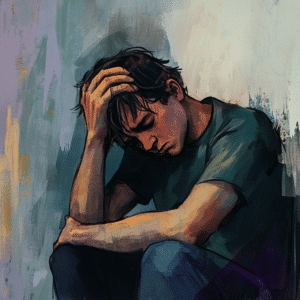Pondering the Unsettling Question: How Long Does Grief Exhaustion Last?
Mothers Against Addiction, a non-profit organization dedicated to supporting parents grappling with the horrifying reality of a child’s addiction or unexpected loss, seeks to explore a critical question that haunts many hearts – how long does grief exhaustion last?
Understanding Grief Exhaustion – Beyond Conventional Comprehension
Grief exhaustion, an overlooked phenomenon, is more than the occasional dampening of spirits. It’s akin to a relentless storm, ruthlessly consuming every inch of one’s wellbeing. Grieving isn’t only an emotional process; its claws have a far-reaching grasp impacting your physical health, corking you up with fatigue, restlessness, or even cold or flu-like symptoms. Your body and mind are held captive within the relentless cycle of this pain, a feeling that can persist for weeks or even months.
Scientific Insight into the Enigma of Grief Exhaustion
The intersection of science and grief has produced floodlight insights, depicting that the impact of grief is hardwired in our brain. Researchers have discovered that grief exhaustion directly influences the sections of the brain that manage stress, mood, and memory. It’s like a domino effect where the psyche’s storm waves ripple into the body, triggering various physical manifestations. Even the heart bears the brunt of this pain, hence the term ‘Broken Heart Syndrome’ – a seasoned testimony to the ordeal endured by grieving hearts.
Diverse Emotional Price Tags of Grief: Distress and Its Many Faces
Grief, much akin to the visages of an antique coin, has various faces. The emotions that follow can range from immense sadness, anger, guilt to fear and a sense of relief. As we unravel the layers of emotions that often accompany the death of a loved one, the terrifying question ‘can you die from sadness’ gnaws at the corner of our hearts. The Moms Against addiction delve into the depth of this tormenting question, offering a beacon of understanding and guidance within the darkness of grief.
Deciphering the Duration: How Long Does Grief Fatigue Last?
Enter the labyrinth of grief, and one can easily find oneself spiralling within its complex matrix, engulfed by confusion and insecurity. The burning question of ‘how long does grief fatigue last’ seeks to establish a semblance of predictability within the tempest.

Unveiling Typical Timelines of Grief and Loss Responses
The duration of grief significantly differs from person to person. Like snowflakes, no two patterns of grief are alike. Yet, research suggests the average span lies anywhere from 6 months to 2 years. However, an unsettling thought lingers; can the burden of grief be so enormous that tears can turn into death’s accomplice? The notion may seem far-fetched, but read the gripping account of “can You die From crying too much” to understand how weak lines separate distress and physical demise.
Varied Research Studies on Grief Fatigue Duration
Scientific exploration offers universally recognized models like Kübler-Ross’s Five Stages of Grief, providing a loose framework for understanding grieving’s progression. Yet, it’s important to remember that everyone swims through the sea of grief at their own pace. Thus, establishing a definitive timeframe remains inexplicably challenging, raising the poignant query of ‘how long does grief exhaustion last’ yet again.
Unique Circumstances and Factors Impacting the Length of Grief Fatigue
The longevity of grief is influenced by one’s relationship with the deceased, the nature of death, personal resilience, and surrounding support system. Unresolved guilt often acts as an anchor, drowning one deeper into the abyss of grief. For parents grappling with the ripple effects of untangling guilt from grief, this insightful piece on “guilt grief” serves as a torchlight in the dark corners of guilt-ridden despair.
| Subject | Description | Timeframe |
|---|---|---|
| Emotional Grief | Emotional grief is a natural response to significant loss, often featuring profound sadness. This duration will differ from person to person and has no set timetable. | Can last from 6 months to many years |
| Physical Grief | The physical manifestations of grief such as exhaustion, restlessness, and flu-like symptoms. These symptoms typically come and go, gradually improving over time. | Usually improve over the course of a few months to years |
| Normal Grief | The typical process of grief one experiences after a significant loss. This process involves a range of emotional, physical, and social changes. | Average duration is between 6 months to 2 years, or more |
| Improvement of Grief | The point at which the intensity of the grieving process starts lessening, allowing for some relief. However, note that improvement does not mean the ending of the grieving process. | Research suggests many people see improvement around 6 months after a loss |
| Health Impact | Grief affects emotional, social, and mental health, potentially leading to issues like depression, anxiety, and social withdrawal. It’s important to seek professional help if needed. | Health impacts can continue for years if not properly managed. |
The Conundrum of Nocturnal Sorrow: Why is Grief Worse at Night?
If grief is an ever-present spectre, the night is its favourite dwelling place. One may wonder, ‘Why is grief worse at night?’. A glance at the ticking clock, the moonlit silence, and suddenly dusk’s tranquillity transforms into a haunted alley. Let’s delve into the reasons behind these intensified night-time blues.
The Biological Clock and Its Influence on Grieving
Our bodies are sundials, finely tuned with nature’s rhythms. The absence of sunlight signals the brain to produce melatonin, paving the way for our sleep. But the night also cloaks us in solitude, bringing thoughts of our departed loved ones into poignant focus. The darkness seems to magnify grief’s weight, making it more burdensome to bear.
The Puzzling Relationship Between Sleep, Darkness, and Grief
As we slide into the velvety darkness of the night, our defences significantly lower, laying bare the raw intensity of grief. In the silence of the night, the mind becomes a breeding ground for thoughts, often amplifying feelings of loss and loneliness.
Therapeutic Approaches for Nighttime Grief Management
The grappling tide of sorrow can be challenging to overcome, but thanks to leaps in therapy and counselling, hope exists. Addressing the nocturnal aspects of grief involves taking steps for better sleep hygiene, seeking comfort in night-time routines, or exploring professional help when needed.

Emerging Techniques Shaping the Healing Timeline: Offering Hope in Despair
Grief might be the dark night of the soul, but it’s not devoid of dawn. Emerging therapeutic practices present a glimmer of hope on the otherwise aching horizon of sorrow, aiding the bereaved to navigate the bewildering question of ‘how long does grief exhaustion last?’.
Innovative Therapies for Grieving: A New Vanguard in Emotional Healing
From conventional therapy sessions to digital platforms like Fabelmans streaming, empathetic platforms provide essential emotional care, helping individuals express, understand, and cope with their grief.
Healing Role of Support Groups and Peer Networks
Real-life stories depict the healing power of support groups and networks, especially for parents walking on the same painful road. They provide a safe cocoon for voicing out overwhelming emotions and feelings like guilt grief that often find refuge in silence.
The Revolutionary Impact of Cognitive-behavioural Therapy and Mindfulness
Grieving hearts can seek solace in practices like cognitive-behavioural therapy and mindfulness. These techniques equip one with healthier coping mechanisms, transforming the grieving journey into more of a learning curve than an uphill task.
Harnessing the Power of Body: Exercise to Mitigate Grief Exhaustion
The Science Behind Exercise and Emotional Health
Exercise is a known catalyst for emotional well-being. As you move, you signal your brain to churn up a delicious cocktail of endorphins, hormones renowned as natural mood up-lifters.
Transforming Grief Through Physical Activity: Real-Life Stories
Real-life accounts echo the healing power of physical activity. Even changing your surroundings for a brisk walk can offer a fresh perspective, adding a silver lining to your gloomy grief-filled days.
Mastering Grief Exhaustion: Newfound Hope in Post-Grief Resilience
Building Resilience Amidst Overwhelming Grief and Loss
Embrace, Understand, and Grow: Components of Post-Grief Resilience
The resilience honed in the crucible of grief becomes the bridge between loss and life. Embracing grief, understanding its role, and choosing growth often herald a journey from surviving grief to thriving amidst it.
From Surviving to Thriving: Inspiring Journeys of Resilience
Personal journeys illuminate the vast stretch from mere survival to blossoming resilience. For example, Elizabeth Vargas’ compelling tale of her fight against addiction, as she rose from the ashes of her suffering, inspires many in comparable situations.

Promising Horizons: Healing Beyond the Grief Exhaustion Timeline
Reclaiming Life After Grief: Ways Forward
Harnessing Personal Strengths to Overcome Loss
Summoning personal strengths might seem taxing amidst overwhelming grief, but it lays the foundation for reclaiming life post-grief. Armed with sturdy emotional padding like Apl Sneakers, moving beyond the grief exhaustion timeline becomes a possible and achievable goal.
New Research Avenues: Unfolding Grief’s Complexity and the Healing Process
Scientists and researchers continue to unfold the intricate layers of grief’s complexity, paving the way for implementing newer strategies to support the grieving process. From a haunting question to a journey of understanding, the exploration into how long does grief exhaustion last can harbour an empowering transformation.
How long does the fatigue of grief last?
Whew, the length of grief-induced fatigue can be like a stretch of bad road, my friend—long and bumpy. It can last for weeks, or even several months, but eventually, there’s a smoother ride ahead.
Why does grief make you so exhausted?
Why does grief make you feel like you’ve run a marathon? Well, it’s like lugging around heavy emotional baggage, and that’s exhausting. Your body is processing a lot in a short time, mate, which is bound to wear you down.
How long does it take to recover from grief?
How long does it take to recover from grief? Well, it’s not a race, love. It can take as little as six months, or as long as several years. It’s a personal journey with many pit stops, so don’t sweat the stopwatch.
What does intense grief do to your body?
Intense grief? Oh, boy, it’ll take its toll on your body, no two ways about it. It can increase your risk for health issues like heart disease and reduced immunity—like adding insult to injury.
How do you deal with grief fatigue?
Dealing with grief fatigue is all about self-care, alright? It’s like recharging your batteries. Make time for rest, maintain a balanced diet, and reach out to a support network—you don’t have to go it alone.
What year of grief is the hardest?
That hardest year of grief? Well, if you ask me, it’s probably the first year. It’s a roller coaster of ‘firsts’ without your loved one—first holidays, birthdays. It can be a real doozy.
Do you sleep more when you’re grieving?
Sleep and grief? Oh, absolutely, you might find yourself catching more Z’s. Your body’s trying to cope with emotional distress, and sleep is its way of handling the overload.
Can you get burnout from grief?
Burnout from grief? Sure as eggs. Chronic grief is like running a marathon without a finish line—it’s mentally, emotionally, and physically draining.
Does grief age your face?
Grief can make your face look like an old road map—that’s right. Stress from grief can cause wrinkles and other signs of aging. It’s a harsh reality, I know.
How long does grief brain fog last?
Grief brain fog? It sticks around like a bad smell. It can last for weeks or even go on for several months. It depends on the individual, and how they’re dealing with their loss.
Does grief get worse at 6 months?
Grief getting worse at six months? Sometimes, for sure. That’s when the reality sets in, and the initial shock wears off—it’s like the eye of the emotional hurricane.
Does grief ever fully go away?
Grief ever fully going away? Eh, it’s tricky. The intense pain lessens over time, but the sense of loss may always be there, just like a scar from a deep cut.
What organ does grief weaken?
The organ grief hits hardest? Your old ticker, the heart. The stress of losing a loved one can cause what’s called Broken Heart Syndrome—it’s a real kick in the teeth.
What part of the body holds grief?
Where is grief held in the body? Some folks say it lingers in the lungs, making it hard to breathe. Never underestimate the weight of emotional pain.
Where is grief stored in the body?
Grief stored in the body? Commonly, it’s felt in the chest or stomach—like butterflies in your stomach, but not the fun kind, you get me?
Can grief cause mental exhaustion?
On mental exhaustion from grief? Yes, siree. Grieving is a mental workout, and like any workout, it can lead to fatigue.
How long does 7 stages of grief last?
The seven stages of grief can take as long as the heart needs, mate—as short as a few weeks to as long as a couple of years. It’s a winding road without a set GPS route.




























